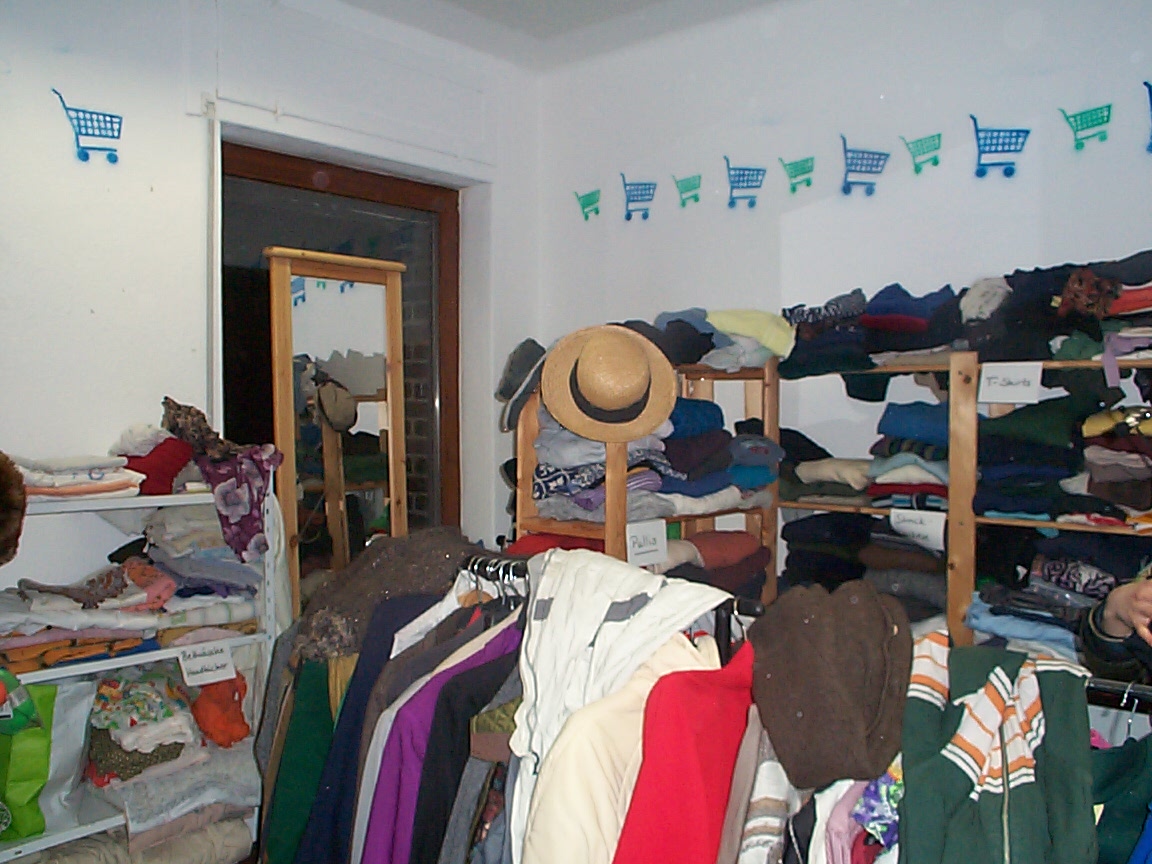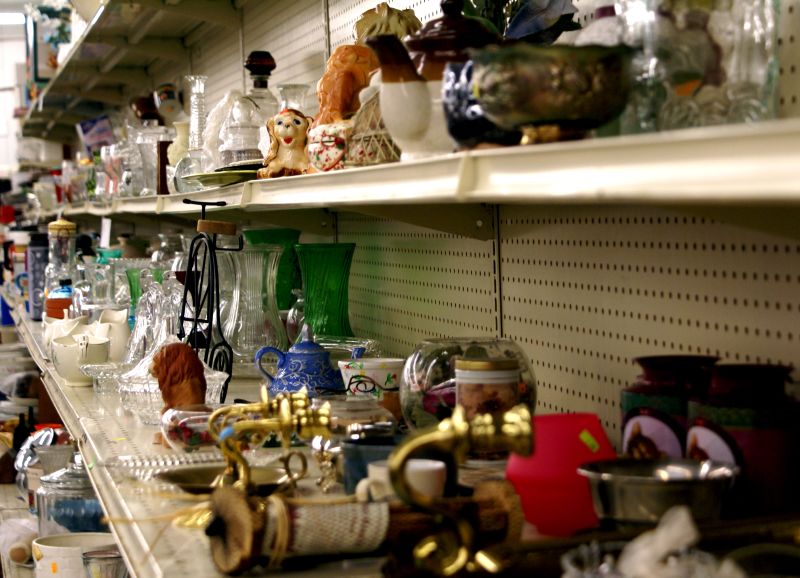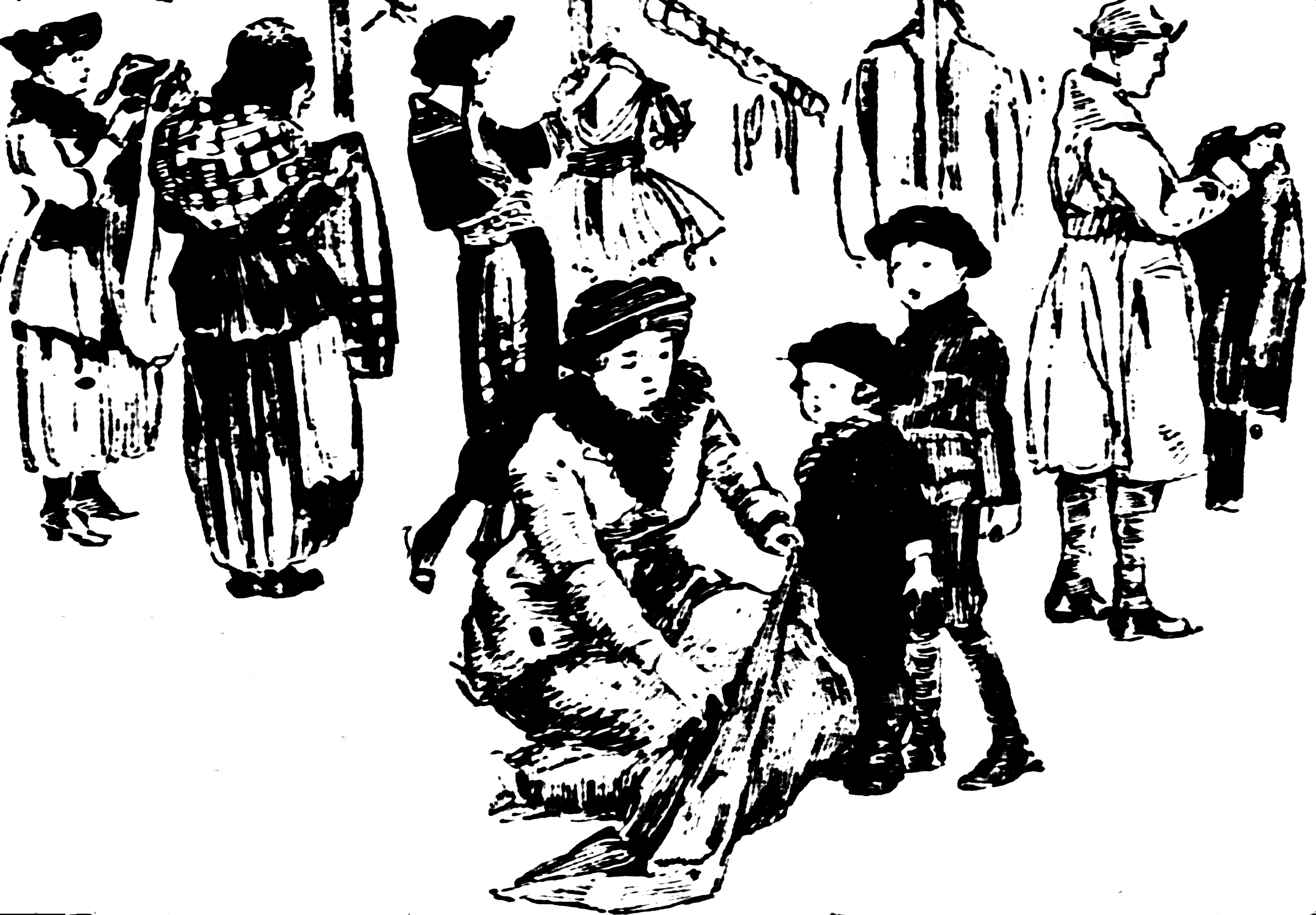|
Give-away Shop
Give-away shops, freeshops, free stores or swap shops are stores where all goods are free. They are similar to charity shops, with mostly second-hand items—except that everything is available at no cost. All goods are freely given away, although some operate a one-in, one-out–type policy (swap shops). Free stores constitute a form of constructive direct action that provides a shopping alternative to a monetary framework, allowing people to exchange goods and services outside of a money-based economy. History The anarchist 1960s counterculture, 1960s countercultural group Diggers (theatre), the Diggers opened free stores that simply gave away their stock, provided free food, distributed free drugs, gave away money, organized free music concerts, and performed works of political art. The Diggers took their name from the original Diggers, English Diggers led by Gerrard Winstanley and sought to create a mini-society free of money and capitalism. Similar phenomena Another rece ... [...More Info...] [...Related Items...] OR: [Wikipedia] [Google] [Baidu] |
Charity Shop
A charity shop is a retail establishment run by a charitable organization to raise money. Charity shops are a type of social enterprise. They sell mainly used goods such as clothing, books, music albums, shoes, toys, and furniture donated by the public, and are often staffed by volunteers. Because the items for sale were obtained for free, and business costs are low, the items can be sold at competitive prices. After costs are paid, all remaining income from the sales is used in accord with the organization's stated charitable purpose. Costs include purchase and/or depreciation of fixtures (clothing racks, bookshelves, counters, etc.), operating costs (maintenance, municipal service fees, electricity, heat, telephone, limited advertising) and the building lease or mortgage. Terminology Charity shops may also be referred to as thrift stores (American English and Canadian English) also including for-profit stores such as Savers) or in the United States and Canada), hospice shop ... [...More Info...] [...Related Items...] OR: [Wikipedia] [Google] [Baidu] |
Retail Formats
Retail is the sale of goods and Service (economics), services to consumers, in contrast to wholesaling, which is the sale to business or institutional customers. A retailer purchases goods in large quantities from manufacturing, manufacturers, directly or through a wholesaler, and then sells in smaller quantities to consumers for a Profit (accounting), profit. Retailers are the final link in the supply chain from producers to consumers. Retail markets and shops have a long history, dating back to antiquity. Some of the earliest retailers were itinerant peddlers. Over the centuries, retail shops were transformed from little more than "rude booths" to the sophisticated shopping malls of the modern era. In the digital age, an increasing number of retailers are seeking to reach broader markets by selling through multiple channels, including both bricks and mortar store, bricks and mortar and Online shopping, online retailing. Digital technologies are also affecting the way that co ... [...More Info...] [...Related Items...] OR: [Wikipedia] [Google] [Baidu] |
Anarchist Movements
Anarchism is a political philosophy and movement that seeks to abolish all institutions that perpetuate authority, coercion, or hierarchy, primarily targeting the state and capitalism. Anarchism advocates for the replacement of the state with stateless societies and voluntary free associations. A historically left-wing movement, anarchism is usually described as the libertarian wing of the socialist movement (libertarian socialism). Although traces of anarchist ideas are found all throughout history, modern anarchism emerged from the Enlightenment. During the latter half of the 19th and the first decades of the 20th century, the anarchist movement flourished in most parts of the world and had a significant role in workers' struggles for emancipation. Various anarchist schools of thought formed during this period. Anarchists have taken part in several revolutions, most notably in the Paris Commune, the Russian Civil War and the Spanish Civil War, whose end marked the end ... [...More Info...] [...Related Items...] OR: [Wikipedia] [Google] [Baidu] |
Giving
Giving may refer to: * Gift, the transfer of something without the expectation of receiving something in return * Generosity, the habit of giving freely without expecting anything in return * Charity (practice) Charity is the Volunteering, voluntary provision of assistance to those in need. It serves as a Humanitarianism, humanitarian act, and is unmotivated by self-interest. Various Philosophy, philosophies about charity exist, with frequent association ..., the giving of help to those in need who are not related to the giver * '' Giving: How Each of Us Can Change the World'', a book by Bill Clinton * ''Giving'' (album), an album by Colm Ó Snodaigh See also * Alternative giving, a form of gift-giving in which the giver makes a donation to a charitable organization in the recipient's name * GAVE (other) * Give (other) * Given (other) * '' The Giver'', a novel by Lois Lowry * Givers, an American indie rock band {{disambig ... [...More Info...] [...Related Items...] OR: [Wikipedia] [Google] [Baidu] |
Take A Penny, Leave A Penny
"Take a penny, leave a penny" (sometimes "Give a penny, take a penny", penny tray, or penny pool) refers to a tray used for convenience in cash transactions. They are found in the United States and Ireland, in gas stations and convenience stores, and were once common in Canada before 2013 when the penny (Canadian coin), penny was taken out of circulation. Usage A small tray near a cash register is designated as a place for customers to discard unwanted Penny (United States coin), pennies received as change. For customers who want to avoid breaking a higher-denomination coin or bill, they can take a penny or two from the tray left by others. The tray can also be used by cashiers. For example, the cashier might take a penny from the tray to then give the customer one quarter instead of six coins totaling 24 cents (two dimes and four pennies). These are also called "penny pools". See also *Cash rounding *Honesty box *Penny debate in the United States References Personal fi ... [...More Info...] [...Related Items...] OR: [Wikipedia] [Google] [Baidu] |
Second-hand Shop
__NOTOC__ A second-hand shop is a shop which sells used goods. Secondhand shops are often part of the different parts of the reuse or Circular economy. Different formats of second-hand shop exist, selling in different formats and type of content: from antique stores, to consignment, and various types of thrift or charity shop, where the used goods are sold. The format of selling second hand goods in a shop, is not ubiquitous: the cost of operating a physical location alongside the need to handle large inventory, sometimes means that resellers opt for temporary venues like Flea market, garage sales or temporary pop-up type sales. Some goods have always had a vibrant second hand market that allow for the creation of permanent venues, such as antiques and books. With the advent of social movements focused on reuses in the 21st century, such as the sustainable fashion movement, other goods have become more economical for specialized stores focused on their resale. By forma ... [...More Info...] [...Related Items...] OR: [Wikipedia] [Google] [Baidu] |
Reuse
Reuse is the action or practice of using an item, whether for its original purpose (conventional reuse) or to fulfill a different function (creative reuse or repurposing). It should be distinguished from recycling, which is the breaking down of used items to make raw materials for the manufacture of new products. Reuse—by taking, but not reprocessing, previously used items—helps save time, money, energy and resources. In broader economic terms, it can make quality products available to people and organizations with limited means, while generating jobs and business activity that contribute to the economy. Examples Reuse centers and virtual exchange Reuse centers (also known as a "swap shop" or a "take-it-or-leave-it") facilitate the transaction and redistribution of unwanted, yet perfectly usable, materials and equipment from one entity to another. The entities that benefit from either side of this service (as donors, sellers, recipients, or buyers) can be businesses, nonprof ... [...More Info...] [...Related Items...] OR: [Wikipedia] [Google] [Baidu] |
Regiving
Regifting or regiving is the act of taking a gift that has been received and giving it to somebody else, sometimes in the guise of a new gift. Concept Regifting differs from straightforward giving in that goods are not acquired specifically for donation. Typically, goods that have been received as a gift are offered to others, unbeknown to them that it was originally a gift to the person offering it. Often the motives are principally charitable but also includes giving items which are surplus to one's needs. However, regifting also refers to the act of giving away unwanted gifts as a way of disposing them. Regiving differs from recycling in that recycling is most often associated with breaking components down and rebuilding into new products. Etymology The term was popularized by a 1995 episode of the NBC sitcom ''Seinfeld'' ("The Label Maker"), although the practice pre-dates the term considerably. In the episode, the character Elaine Benes, Elaine calls List of Seinfeld charac ... [...More Info...] [...Related Items...] OR: [Wikipedia] [Google] [Baidu] |
Recycling
Recycling is the process of converting waste materials into new materials and objects. This concept often includes the recovery of energy from waste materials. The recyclability of a material depends on its ability to reacquire the properties it had in its original state. It is an alternative to "conventional" waste disposal that can save material and help lower greenhouse gas emissions. It can also prevent the waste of potentially useful materials and reduce the consumption of fresh raw materials, reducing energy use, air pollution (from incineration) and water pollution (from landfilling). Recycling is a key component of modern waste reduction and represents the third step in the "Reduce, Reuse, and Recycle" waste hierarchy, contributing to environmental sustainability and resource conservation. It promotes environmental sustainability by removing raw material input and redirecting waste output in the economic system. There are some ISO standards related to recycling, su ... [...More Info...] [...Related Items...] OR: [Wikipedia] [Google] [Baidu] |
Gift Economy
A gift economy or gift culture is a system of exchange where valuables are not sold, but rather given without an explicit agreement for immediate or future rewards. Social norms and customs govern giving a gift in a gift culture; although there is some expectation of reciprocity, gifts are not given in an explicit exchange of goods or services for money, or some other good or service.R. Kranton: ''Reciprocal exchange: a self-sustaining system'', American Economic Review, V. 86 (1996), Issue 4 (September), pp. 830–851 This contrasts with a market economy or bartering, where goods and services are primarily explicitly exchanged for value received. The nature of gift economies is the subject of a foundational debate in anthropology. Anthropological research into gift economies began with Bronisław Malinowski's description of the Kula ring in the Trobriand Islands during World War I. The Kula trade appeared to be gift-like since Trobrianders would travel great distances over ... [...More Info...] [...Related Items...] OR: [Wikipedia] [Google] [Baidu] |
Food Not Bombs
Food Not Bombs (FNB) is a loose-knit group of independent collectives, sharing free, usually vegan and vegetarian food with others. The group believes that corporate and government priorities are skewed to allow hunger to persist in the midst of abundance. To demonstrate this, FNB serves surplus food gathered from grocery stores, bakeries and markets which would otherwise go to waste, or occasionally has already been thrown away. The group exhibits a form of franchise activism. Background and principles Food Not Bombs is an all-volunteer global movement sharing free, usually vegan meals as a protest against war and poverty. Each chapter collects surplus food from grocery stores, bakeries, and that would otherwise go to waste and occasionally collects items from garbage dumpsters when stores are uncooperative. FNB also accepts donations from local farmers, then prepares free community meals which are offered to anyone who is hungry. Meals are usually vegan or vegetarian, a ... [...More Info...] [...Related Items...] OR: [Wikipedia] [Google] [Baidu] |







